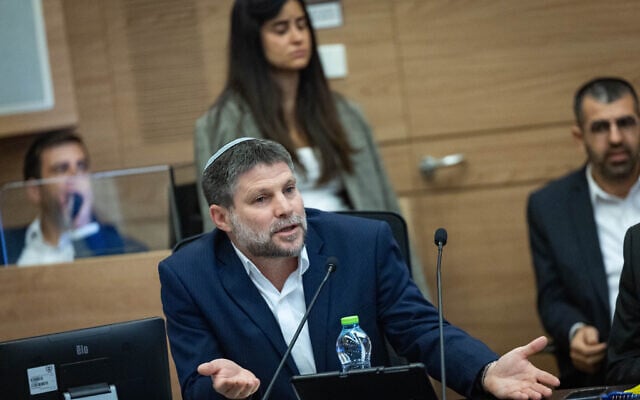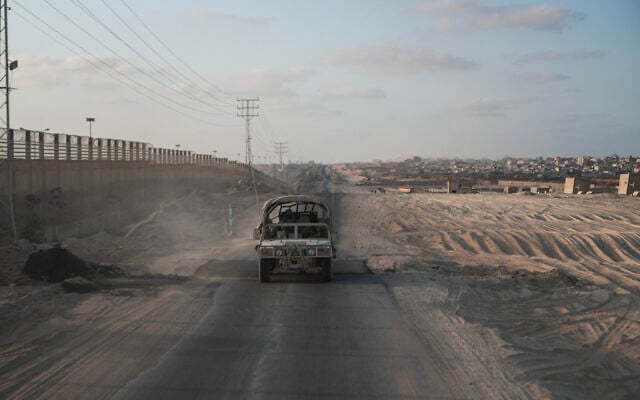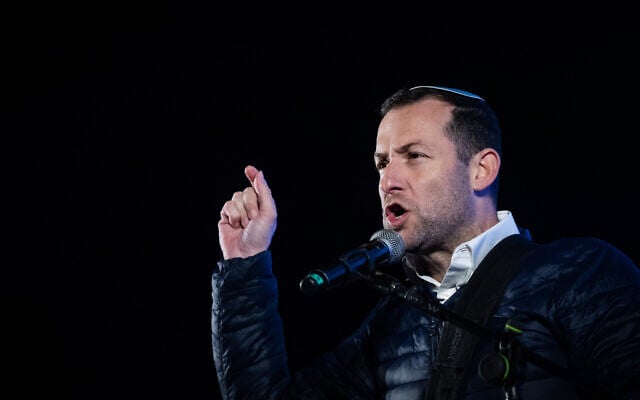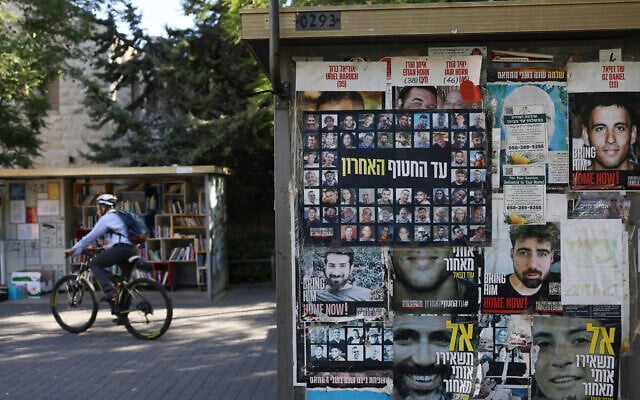

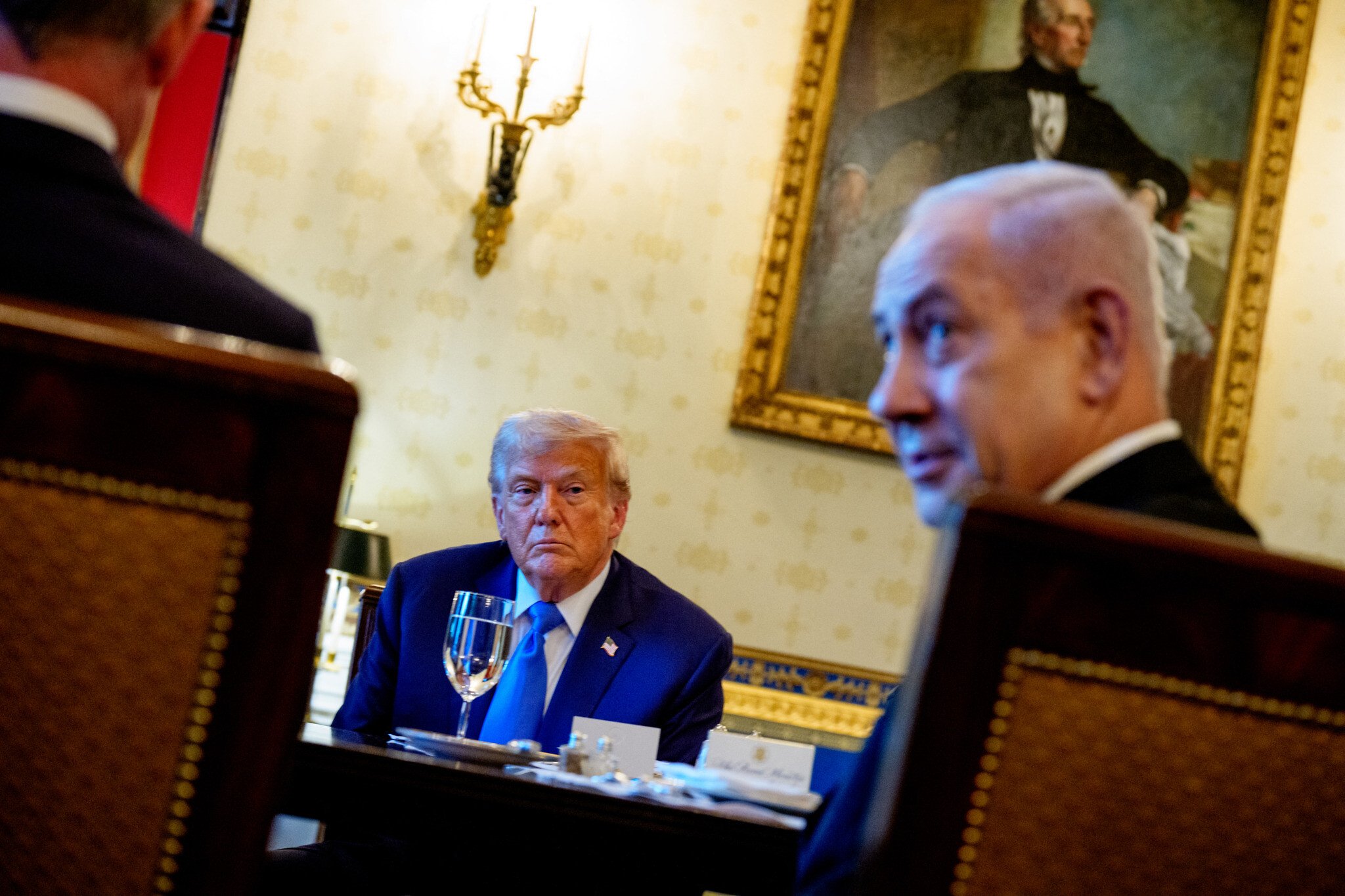
WASHINGTON — The addition of a press conference to Prime Minister Benjamin Netanyahu’s White House meeting with US President Donald Trump raised speculation Monday that the Trump administration could be planning to announce that it has finalized its agreement for ending Israel’s war against Hamas in Gaza and releasing the remaining hostages held there.
The meeting, Netanyahu’s fourth trip to the White House since Trump returned to office in January, will focus on the US president’s 21-point plan to end the Gaza war, set up a postwar governing mechanism, and bring home the 48 hostages held by terror groups, some 20 of whom are thought to be alive.
US special envoy Steve Witkoff held a roughly two-hour meeting with Netanyahu at his hotel in Washington on Sunday, where the top Trump aide worked to get Netanyahu on board despite the latter’s pushback regarding the proposal’s terms for Hamas’s disarmament and the role of the Palestinian Authority in postwar Gaza, a source familiar with the development told The Times of Israel.
Jared Kushner, the president’s son-in-law and former senior adviser, also participated in the meetings.
Hebrew media reported that the Witkoff meeting went well and that Netanyahu is likely to express his support for the plan when the two leaders meet on Monday at the White House.
Israel was still deliberating the plan on Monday, and there reportedly remain divisions between Jerusalem and Washington.
Hamas said it hadn’t even been presented with the proposal yet.
The US has secured initial backing from Arab and Muslim partners needed for the postwar management of Gaza.
However, the changes Netanyahu succeeded in making to the US plan could risk losing the support of the Arab and Muslim nations, which have emphasized the importance of a role for the PA in Gaza and a potential pathway to a future Palestinian state — two red lines for the Israeli premier that he surely sought to remove.
A whirlwind of media reports and speculation surrounding the plan continued Monday, with Israel said to be pushing to limit Hamas-backer Qatar’s role in postwar Gaza amid deteriorating ties between Jerusalem and Doha, the Ynet outlet reported Monday.
The US views the Qataris as a valuable partner and wants them to take a large role, and Doha has also been a mediator in ceasefire talks throughout the Gaza war
Israel is also pushing to have the agreement clearly state that the IDF will have freedom to act should Hamas try to rearm or rebuild its forces after a deal is signed, Ynet reported. Mediators are concerned that including such a statement could deter Hamas from agreeing to the deal.
On Friday, Trump had begun declaring that he thought a deal had been reached.
But without Hamas’s approval, it’s unclear how significant an announcement of a deal would be.
One of the plan’s 21 points states that much of the agreement can move forward even if Hamas doesn’t agree, including the establishment of a new transitional government of Palestinian technocrats and an international stabilization force in areas cleared of Hamas’s presence — which includes the vast majority of the Strip.
However, without Hamas releasing the remaining 48 hostages, it’s unlikely that Israel will agree to halt its offensive in Gaza City and beyond.
Several Arab nations and the Palestinian Authority have also requested changes to Trump’s Gaza peace plan, Channel 12 reported Monday.
The report said they were asking to soften the language, saying that Hamas will be disarmed, and instead say Hamas will be asked to hand over its weapons.
They were also reportedly asking that the immediate postwar government be more clearly aligned with the PA, something Israel opposes.
In addition, they were suggesting that any international peacekeeping force be deployed along the border with Israel and not inside Gaza. That request apparently came at the behest of Hamas, the report said.
Netanyahu will also likely face opposition to the plan from within his coalition.
Far-right Finance Minister Bezalel Smotrich has made his Religious Zionism party’s support for the plan dependent on a series of conditions, some of which undermine the main elements of the proposal to end the war that was triggered by the Hamas-led invasion of southern Israel on October 7, 2023.
Smotrich announced that he informed Netanyahu of his party’s “red lines” ahead of the meeting with Trump, laying down conditions that directly clashed with some of those sought by the PA and Arab states.
The far-right minister gave six conditions under which his party will support the deal, which were a marked shift in his stance that previously demanded the complete military destruction of Hamas and envisioned Israeli governance of Gaza, including the establishment of settlements there. Smotrich has in the past threatened to leave the government if the war was stopped. The departure of his government would leave the coalition with a minority.
In a statement, Smotrich said that his party’s red lines “include ending the war only with the full and genuine dismantling and demilitarization of Hamas and the Gaza Strip.”
Israeli forces must remain on the perimeter of the Strip, including on the Philadelphi Corridor along the Gaza-Egyptian border, and have complete freedom of action throughout the coastal territory, Smotrich said. Controlling the Philadelphi Corridor would require an Israeli presence on a strategic section of Gaza territory.
Smotrich additionally demanded that there be no role at all for the PA in ruling the Strip, not even obliquely, saying that such a role would be tantamount to acknowledging a Palestinian state.
Furthermore, he said that the agreement contain “not even a hint” of a mention of a Palestinian state. “The idea of a Palestinian state needs to be completely removed from the table.”
Smotrich also demanded that there be no role at all for Qatar in the postwar running of Gaza, calling the Gulf state “two-faced hypocrites that sponsor terror.”
Finally, Smotrich demanded that the border to Egypt be opened to allow Palestinians who want to leave Gaza to go to any land that will accept them. The minister has backed a proposal to move all of Gaza’s residents abroad.
“Gaza will no longer be a prison where people are held by force illegally and immorally just to harm the State of Israel,” he said.
Smotrich also addressed the topic of Israel annexing the West Bank, one of the key platforms of his party.
Referring to the West Bank by its biblical names, Smotrich wrote that he expected Netanyahu to “establish politically and practically the fact that Judea and Samaria are an inseparable part of the sovereign state of Israel, and to put on the table an alternative plan for managing the lives of the Arabs of Judea and Samaria themselves.”
Trump’s 21-point plan, exclusively revealed by The Times of Israel, outlines a potential pathway to a future Palestinian state, something Netanyahu has firmly and repeatedly rejected, stating at the UN on Friday that such a move would be “sheer madness.” He has also consistently rejected the Palestinian Authority having any role in governing postwar Gaza, while Trump sees a possibility of a reformed PA helping run the Strip.
Trump and Netanyahu don’t see eye-to-eye on the idea of Israel annexing parts of the West Bank — the US president told reporters at the White House on Thursday, “I will not allow Israel to annex the West Bank. I will not allow it. It’s not going to happen.”
Netanyahu’s allies to the right, including settlement leaders, have been pushing for Israel to apply its sovereignty to parts of the West Bank, particularly as a reaction to the wave of Western countries recognizing a Palestinian state.
Netanyahu reportedly met with West Bank settlement leaders on Sunday night ahead of his meeting with Trump, and said he would raise the issue of Israel applying sovereignty to the West Bank.
But he also reportedly acknowledged facing a “complicated reality,” signaling that Israeli annexation of parts of the West Bank is unlikely.
Hebrew media reports said that the Netanyahu meeting in New York included Israel Ganz, who heads the settlement umbrella group the Yesha Council, and Yossi Dagan, who heads the Samaria Regional Council, among others.
In the meeting, Netanyahu reportedly compared Trump favorably to former US president Barack Obama, who vocally pressured Israel to freeze settlement construction.
“We have a supportive president,” Netanyahu reportedly said regarding Trump. “Remember the Obama era, when he told us not to lay even one brick.”
Dagan said that he emerged from the meeting with Netanyahu “very concerned.”
He told Ynet that Netanyahu listened to the settler representatives but refused to commit to a time frame for Israel annexing the West Bank.
“This government could sign off on the establishment of a Palestinian state — that’s the next October 7,” Dagan said.
Not only has Trump ruled out West Bank annexation, but the UAE, which normalized relations with Israel five years ago, said the move would be a “red line.”
Meanwhile, the Hostage and Missing Families Forum sent a letter to Trump ahead of his meeting with Netanyahu, thanking him profusely for his efforts to free the captives and imploring him to push the latest deal over the line.
The Hamas October 7 attack killed 1,200 people and saw terrorists seize 251 hostages who were abducted to Gaza. Of those, 48 remain in captivity, 20 of them believed still alive.
“We are grateful, and dependent on your strength and the strength and awesome power of the United States of America,” families wrote, noting his commitment to their cause.
The families asked Trump to “stand firm against any attempts to sabotage the deal you have brought forth.”
“The stakes are too high, and our families have waited too long, for any interference to derail this progress.”
“Your dual focus on ending the war and bringing all 48 hostages home stands in stark contrast to the expanded war that Israel is currently conducting. We want to thank you for boldly sticking to your conviction despite this contrast,” the letter said, referring to a recently launched military offensive to capture Gaza City.
“We want to thank you for boldly sticking to your conviction despite this contrast. We know this will be a focus of Monday’s meeting with Prime Minister Netanyahu.”
“Please, Mr. President, don’t stop. We need you. 48 of our loved ones – our fathers, siblings, children – need you. We need our loved ones home.”
The forum also appeared to double down on accusations it has made in the past against Netanyahu, blamed for “sabotaging” various ceasefire proposals during the two-year war that would have led to the release of their relatives. Critics say that Netanyahu has continued the war to satisfy the far-right elements of his coalition that have threatened to leave the government if the campaign is halted.




